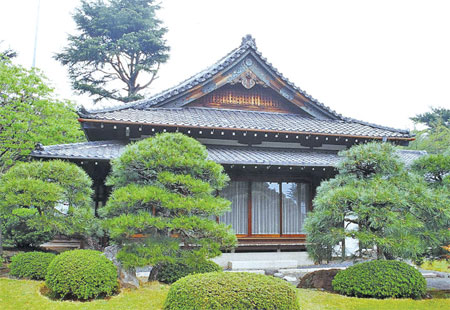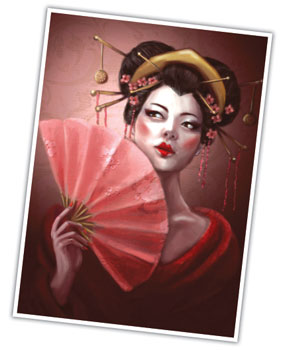The story of Princess Hase
Many, many years ago there lived in Nara, the ancient capital of
Japan, a wise State minister, Prince Toyonari Fujiwara. His wife was a
noble, good, and beautiful woman called Princess Murasaki (Violet). They
had been married by their respective families according to Japanese
custom when very young, and had lived together happily ever since. They
had, however, one cause for great sorrow, for as the years went by no
child was born to them.
 This made them very unhappy, for they both longed to see a child of
their own who would grow up to gladden their old age, carry on the
family name, and keep up the ancestral rites when they were dead. The
prince and his lovely wife, after long consultation and much thought,
determined to make a pilgrimage to the temple of Hase-no-Kwannon
(Goddess of Mercy at Hase), for they believed, according to the
beautiful tradition of their religion, that the Mother of Mercy, Kwannon,
comes to answer the prayers of mortals in the form that they need the
most. This made them very unhappy, for they both longed to see a child of
their own who would grow up to gladden their old age, carry on the
family name, and keep up the ancestral rites when they were dead. The
prince and his lovely wife, after long consultation and much thought,
determined to make a pilgrimage to the temple of Hase-no-Kwannon
(Goddess of Mercy at Hase), for they believed, according to the
beautiful tradition of their religion, that the Mother of Mercy, Kwannon,
comes to answer the prayers of mortals in the form that they need the
most.
So the Prince Toyonari and his wife went to the temple of Kwannon at
Hase and stayed there for a long time, both daily offering incense and
praying to Kwannon, the Heavenly Mother, to grant them the desire of
their whole lives. And their prayer was answered.
A daughter was born at last to the Princess Murasaki, and great was
the joy of her heart. On presenting the child to her husband, they both
decided to call her Hase-Hime, or the Princess of Hase, because she was
the gift of the Kwannon at that place. They both reared her with great
care and tenderness, and the child grew in strength and beauty. When the
little girl was five years old her mother fell dangerously ill and all
the doctors and their medicines could not save her. A little before she
breathed her last she called her daughter to her, and gently stroking
her head, said:
"Hase-Hime, do you know that your mother cannot live any longer?
Though I die, you must grow up as a good girl."

Not long after the death of his first wife, Prince Toyonari married
again, a lady of noble birth named Princess Terute. Very different in
character, alas! to the good and wise Princess Murasaki, this woman had
a cruel, bad heart. She did not love her step-daughter at all.
"This is not my child! this is not my child!"
The little Princess was very diligent, and her favourite studies were
music and poetry. She would spend several hours practising every day,
and her father had the most proficient of masters he could find to teach
her the koto (Japanese harp), the art of writing letters and verse. When
she was twelve years of age she could play so beautifully that she and
her step-mother were summoned to the palace to perform before the
Emperor.
It was the festival of the cherry flowers, and there were great
festivities at the court. The Emperor threw himself into the enjoyment
of the season, and commanded that Princess Hase should perform before
him on the koto, and that her mother Princess Terute should accompany
her on the flute.
There was also now another reason why Princess Terute hated her
step-daughter, for she had had the good fortune to have a son born to
her, and in her inmost heart she kept saying:
"If only Hase-Hime were not here, my son would have all the love of
his father."
 So one day she secretly ordered some poison and put it in to some
sweet wine. This poisoned wine she put into a bottle. Into another
similar bottle she poured some good wine. It was the occasion of the
Boys' Festival on the fifth of May, and Hase-Hime was playing with her
little brother. All his toys of warriors and heroes were spread out and
she was telling him wonderful stories about each of them. So one day she secretly ordered some poison and put it in to some
sweet wine. This poisoned wine she put into a bottle. Into another
similar bottle she poured some good wine. It was the occasion of the
Boys' Festival on the fifth of May, and Hase-Hime was playing with her
little brother. All his toys of warriors and heroes were spread out and
she was telling him wonderful stories about each of them.
They were both enjoying themselves and laughing merrily with their
attendants when his mother entered with the two bottles of wine and some
delicious cakes. "You are both so good and happy," said the wicked
Princess Terute with a smile, "that I have brought you some sweet wine
as a reward - and here are some nice cakes for my good children."
And she filled two cups from the different bottles.
Hase-Hime, never dreaming of the dreadful part her step-mother was
acting, took one of the cups of wine and gave to her little step brother
the other that had been poured out for him.
The wicked woman had carefully marked the poisoned bottle, but on
coming into the room she had grown nervous, and pouring out the wine
hurriedly had unconsciously given the poisoned cup to her own child.
Suddenly the little boy screamed and threw himself on the floor, doubled
up with pain.
The attendants rushed for the doctor, but nothing could save the
child-he died within the hour in his mother's arms. When Hase-Hime was
thirteen years of age, she had already been mentioned as a poet of some
merit. This was an accomplishment very much cultivated by the women of
old Japan. It was the rainy season at Nara, and floods were reported
every day as doing damage in the neighbourhood. An Imperial edict was
sent forth to all the Buddhist temples commanding the priests to offer
up continuous prayers to Heaven to stop the noise of the flood. But this
was of no avail.
Then it was whispered in court circles that the Princess Hase, the
daughter of Prince Toyonari Fujiwara, second minister at Court, was the
most gifted poet of the day, though still so young, and her masters
confirmed the report. Long ago, a beautiful and gifted maiden-poet had
moved Heaven by praying in verse, had brought down rain upon a land
famished with drought-so said the ancient biographers of the poetess
Ono-no-Komachi.

If the Princess Hase were to write a poem and offer it in prayer,
might it not stop the noise of the rushing river and remove the cause of
the Imperial illness? What the Court said at last reached the ears of
the Emperor himself, and he sent an order to the minister Prince
Toyonari to this effect.
Great indeed was Hase-Hime's fear and astonishment when her father
sent for her and told her what was required of her. Heavy, indeed, was
the duty that was laid on her young shoulders - that of saving the
Emperor's life by the merit of her verse.
At last the day came and her poem was finished. It was written on a
leaflet of paper heavily flecked with gold-dust. With her father and
attendants and some of the Court officials, she proceeded to the bank of
the roaring torrent and raising up her heart to Heaven, she read the
poem she had composed, aloud, lifting it heavenwards in her two hands.
Strange indeed it seemed to all those standing round. The waters
ceased their roaring, and the river was quiet in direct answer to her
prayer. After this the Emperor soon recovered his health. There was only
one person who was not pleased at Hase-Hime's success. That one was her
stepmother. The poor child knew there was no good in protesting to her
unkind step-mother at being sent away in this strange manner, so she
went as she was told.
Prince Toyonari, after some weeks, came home, and was told by his
wife that his daughter Hime had done something wrong and had run away
for fear of being punished.
One day, trying to forget his terrible worry, he called all his men
together and told them to make ready for a several days' hunt in the
mountains.
They were soon ready and mounted, waiting at the gate for their lord.
He rode hard and fast to the district of the Hibari Mountains, a great
company following him. He was soon far ahead of every one and at last
found himself in a narrow picturesque valley.
Looking round and admiring the scenery, he noticed a tiny house on
one of the hills quite near, and then he distinctly heard a beautiful
clear voice reading aloud.
The cottage was wide open and she was sitting facing the view.
Listening attentively, he heard her reading the Buddhist scriptures with
great devotion.
More and more curious, he hurried on to the tiny gate and entered the
little garden, and looking up beheld his lost daughter Hase-Hime. She
was so intent on what she was saying that she neither heard nor saw her
father till he spoke.
"Hase-Hime!" he cried, "it is you, my Hase-Hime!" Taken by surprise,
she could hardly realise that it was her own dear father who was calling
her, and for a moment she was utterly bereft of the power to speak or
move.
"My father, my father! It is indeed you - oh, my father!" was all she
could say, and running to him she caught hold of his thick sleeve, and
burying her face burst into a passion of tears.
Her father stroked her dark hair, asking her gently to tell him all
that had happened, but she only wept on, and he wondered if he were not
really dreaming.
Then the faithful old servant Katoda came out, and bowing himself to
the ground before his master, poured out the long tale of wrong .
The Prince's astonishment and indignation knew no bounds. The old
servant Katoda was rewarded with the highest promotion in his master's
service. As Prince Toyonari had no son, he adopted a younger son of one
of the court nobles to be his heir, and to marry his daughter Hase-Hime,
and in a few years the marriage took place.
Hase-Hime lived to a good old age, and all said that she was the
wisest, most devout, and most beautiful mistress that had ever reigned
in Prince Toyonari's ancient house. She had the joy of presenting her
son, the future lord of the family, to her father just before he retired
from active life.
To this day there is preserved a piece of needle-work in one of the
Buddhist temples of Kioto. It is a beautiful piece of tapestry, with the
figure of Buddha embroidered in the silky threads drawn from the stem of
the lotus. This is said to have been the work of the hands of the good
Princess Hase.
- Internet |

